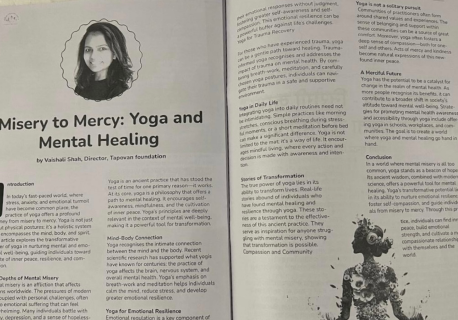
The Yoga Upanishads: A Psychological Savior for Modern Human Suffering
Individual Responsibility and Empowerment
At the core of yoga philosophy is the understanding that true healing comes from within. While therapists and counselors can provide support and guidance, the Yoga Upanishads emphasize that each individual must actively participate in their healing journey. Therapist can only help when an individual show willingness to come out of it. This self-empowerment is crucial; recognizing that you have the ability to address and resolve your mental conflicts fosters a sense of agency. By acknowledging personal challenges, individuals can transform their struggles into valuable resources for growth.
The Quest for Meaning
A central theme in yoga psychology is the search for meaning. Many mental health issues arise when individuals feel their lives lack purpose or significance. The Yoga Upanishads assert that the strongest drive in human existence is the quest for meaning. When individuals engage in practices like meditation and self-reflection, they cultivate a deeper understanding of their values and desires. This process helps to combat feelings of hopelessness and despair, allowing individuals to create a life imbued with purpose.
Overcoming Conditioning
Parinama tapa samskara duhkhaih guna Vritti virodhaccha Duckham evam sarvam vivekinah Change, longing, habits, and the activity of the gunas can all cause us suffering. In fact, even the wise suffer, for suffering is everywhere. —Patanjali Yoga Sutra II.15
The Upanishads teach that conditioning often traps individuals in rigid thought patterns, hindering authentic self-expression. This blind acceptance of preconceived ideas can lead to suffering. By practicing self-awareness and mindfulness, individuals can begin to identify and challenge these patterns. The Yoga Sutras articulate this concept through the causes of suffering, such as parinama (change), tapas (longing), and samskara (habit). Understanding these concepts allows individuals to gain insight into their emotional responses, leading to greater resilience.
Accepting and Understanding Suffering
Suffering is a universal experience, and the Yoga Upanishads encourage individuals to embrace this reality. Patanjali’s teachings remind us that no one is immune to suffering, and acknowledging this shared human experience fosters compassion and empathy. By understanding the causes of suffering, individuals can prepare themselves for future challenges, reducing unnecessary pain. This perspective transforms suffering from a source of despair into a catalyst for positive change and personal growth.
Cultivating Compassion
As individuals learn to accept their own suffering, they become more empathetic toward others. The Yoga Upanishads highlight that every person’s experience of suffering is valid, regardless of its nature. This realization encourages a sense of community and support, which is essential in the healing process. By fostering compassion for themselves and others, individuals can create a nurturing environment that promotes collective healing.
Practical Strategies for Healing
Heyam Duhkha anagatam Prevent the suffering that is yet to come. —Patanjali Yoga Sutra II.16
The teachings of the Yoga Upanishads provide practical tools for self-reflection and emotional regulation. Techniques such as breath awareness and meditation encourage individuals to connect with their inner selves, helping them to process their emotions. Reflecting on one’s feelings allows for greater clarity and understanding, enabling individuals to differentiate between what they can control and what they cannot. This practice of letting go of unhelpful emotions fosters resilience and promotes mental well-being.
Conclusion: A Path Forward
The Yoga Upanishads offer a holistic approach to mental health that integrates philosophical insights with practical techniques. As individuals seek to navigate the complexities of modern life, these ancient teachings provide a roadmap for self-discovery, empowerment, and healing. By embracing the principles of yoga, individuals can transform their suffering into an opportunity for growth, creating lives filled with meaning, purpose, and compassion. In a world where mental health challenges are pervasive, the wisdom of the Yoga Upanishads serves as a powerful ally on the journey toward well-being.
Misery to Mercy: Yoga and Mental Healing
Anand Tapovan is a volunteer-run organization and aims to bring physical, mental, and spiritual wellbeing for everyone. Your support and donation will help reach all those who are in need of these tools.
The Yoga Upanishads: A Psychological Savior for Modern Human Suffering
In today’s fast-paced world, mental health issues are becoming increasingly prevalent. As individuals grapple with anxiety, depression, and feelings of emptiness, the ancient teachings of the Yoga Upanishads offer profound insights and practices that serve as effective therapeutic tools.

